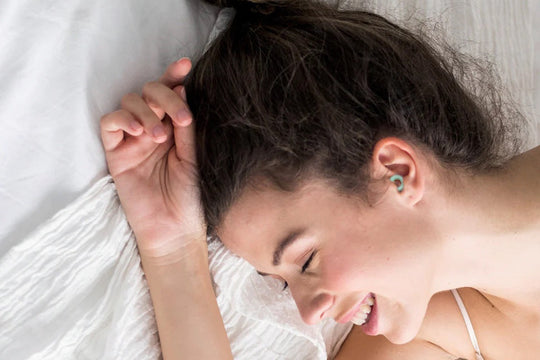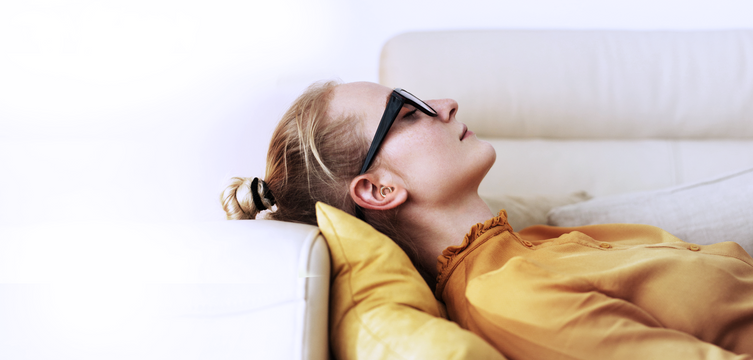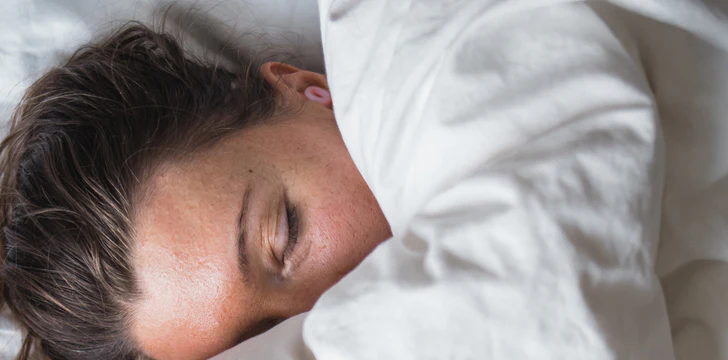Key takeaways:
- There are three different types of sleep apnea – obstructive, central, and complex
- Obstructive sleep apnea is the most common type and it affects between 10% and 30% of adults in the United States
- It’s a sleep disorder in which your breathing stops and starts as you sleep, and can cause problems like snoring, insomnia, headaches and a dry mouth the next day, as well as longer-term medical conditions like type 2 diabetes, high blood pressure and a higher risk of strokes
What springs to mind when you think of sleep apnea?
You might be guilty of thinking it only affects the older generation or those who are overweight. Well, while it is true that the risk is greater among older or overweight people, the truth is that sleep apnea can affect anyone.
According to the Sleep Foundation, the most common type of sleep apnea affects between 10% and 30% of adults in the United States – and the effects of sleep apnea can go further than a poor night’s sleep, causing symptoms like daytime drowsiness and headaches as well as longer-term health problems.
Let’s take an in-depth look at the condition, its different causes and sleep apnea effects – as well as what can be done to treat it. Ready? Let’s dive right in.
What is sleep apnea?
Sleep apnea is a sleep disorder in which your breathing stops and starts as you sleep. These pauses in breath can last for a few seconds, or they may last for as long as several minutes – and for some people, they can happen multiple times each night.
There are three main types of sleep apnea:
Obstructive sleep apnea
This is the most common form of sleep apnea. It happens when the muscles in the back of your throat relax as you sleep, which can lead to your airways becoming blocked or constricted. You might then snort, choke, or gasp for air. This can then become a repetitive cycle, happening even multiple times per hour.
It’s commonly accompanied by snoring, as air can’t pass through your airways normally.
Usually during an episode of restricted breathing, your brain wakes you up, pulling you out of your deep sleep state and allowing your airways to reopen. That means you’ll be able to breathe normally – but it also means that you’ll have a night of interrupted sleep, if it happens frequently.
Central sleep apnea
Less commonly, sleep apnea can happen when your brain isn’t sending the right signals to the muscles that control your breathing. This is called central sleep apnea, and it can cause your breathing to become shallow, and you may have temporary pauses throughout the night.
It often goes hand in hand with insomnia, meaning that you have a difficult time getting to sleep or staying asleep.
Complex sleep apnea syndrome
Also known as treatment-emergent sleep apnea, this occurs when you suffer from both obstructive and central sleep apnea at the same time.
What causes sleep apnea?
Although sleep apnea can affect anyone (including children), there are risk factors that will heighten your chances. These include:
Obesity: Possibly the biggest risk factor, being overweight greatly increases your chances of experiencing sleep apnea.
Gender: If you’re male, you’re two to three times more likely to suffer from sleep apnea than women.
Age: Sleep apnea makes an appearance more frequently in older adults.
Use of substances: The use of substances such as alcohol or sedatives will relax the muscles in your throat, contributing to an increased risk of sleep apnea. If you smoke, you’re also at greater risk.
Allergies: Allergies will give you a regularly stuffy nose, meaning your risk of developing sleep apnea is increased.
Medical conditions: Congestive heart failure, high blood pressure, and Parkinson's disease are some of the medical conditions that could be a trigger for sleep apnea.


Sleep apnea symptoms
Most people don’t realize that they have sleep apnea – so it’s usually pointed out by the unlucky person they share a bed with. Some of the most common signs of sleep apnea include:
- Loud snoring
- Disrupted breathing during sleep, such as gasping for air, choking sounds, or stopping breathing altogether
It can also cause problems the next day, such as:
- A dry mouth when you wake
- A dull or throbbing headache in the morning
- Difficulty staying asleep (insomnia)
- Decreased attention span
Being repeatedly woken up as a result of sleep apnea isn’t just annoying, but also prevents you from getting any good rest. This means you may be spending your days feeling drowsy, fatigued, and more than likely really grumpy. This can have a big impact on your quality of life – and can potentially lead to some ongoing health problems.
The health consequences of sleep apnea
Disrupted sleep and fatigue can undermine your general health – and there are some potentially serious effects of long-term sleep apnea, especially if it’s left untreated.
Some of the effects of untreated sleep apnea include:
- Type 2 diabetes, with studies finding that individuals with sleep apnea have increased glucose levels and increased insulin resistance.
- Heart disease, with some studies showing a link between sleep apnea and an increased risk of heart attacks.
- High blood pressure: When your breathing stops, the oxygen levels in your blood are lowered. This can put a strain on the cardiovascular system and can increase your blood pressure (hypertension).
- A higher chance of having a stroke: Hypertension is one of the risk factors for strokes.
- Depression: Sleep apnea interferes with your sleep, which can cause an increased risk of stress, anxiety and depression.
There’s also a risk if you have to undergo surgery as a sleep apnea sufferer. Surgery that requires anesthesia can be dangerous for people with obstructive sleep apnea. This is because anesthesia slows down breathing and makes you more sensitive to its effects.
Make sure that you make your doctor aware of your sleep apnea before any surgery, so they are aware of it.
Understanding the impact on daily life
As well as having an impact on your own health and wellbeing, the effects of sleep apnea can extend to your personal relationships, too.
Sleep apnea can cause loud snoring – which may well drive your partner crazy, and can have a detrimental impact on your relationship. If your snoring is causing your partner to have a poor night’s sleep, then they may end up being annoyed with you, or even resenting you.
Luckily, there’s one easy solution for partners seeking a peaceful night’s sleep: earplugs for sleeping.
The right pair of earplugs for sleep can help to reduce the amount of noise that reaches the ears. That means that, no matter how loud your snoring is, it shouldn’t affect your partner’s sleep.
Loop Quiet earplugs are specifically designed for sleeping. They’re made from super soft silicone so they’re comfortable to wear all night long – plus, they come with a choice of four different ear tip sizes to ensure the perfect fit.
With up to 24 decibels (SNR) and 14 decibels (NRR) of noise reduction, they significantly reduce the amount of noise that reaches the eardrums – meaning it should be easier for anyone affected by snoring to fall easily into a better sleep.


Treatment options for sleep apnea
The severity of sleep apnea varies from person to person – and the treatment for your sleep apnea will depend on the severity of your case.
If you happen to have a milder case, your doctor will probably recommend making changes to your lifestyle, such as:
- Quitting smoking
- Losing weight
- Exercising
- Experimenting with different sleeping positions
- Avoiding alcohol and sedatives
But if your sleep apnea is on the more severe side, then you might need a more intensive approach. This can include using devices to unblock your airway, known as a continuous positive airway pressure therapy (CPAP) machine. This delivers air pressure through a mask while you sleep. There are also certain oral appliances designed to keep your throat open.
In very severe cases, you might need surgery – but this is usually only reserved as a last-resort solution if other treatments have failed. Your doctor will usually persuade you to try a less invasive treatment for at least three months before having surgery. This surgery could include tissue removal, tissue shrinkage, or jaw repositioning.
Final thoughts
If you’re waking up tired and irritable and you don’t know why, sleep apnea may well be spoiling your beauty sleep. If you think that’s the case – and especially if any of the higher-risk factors apply to you – then take a positive step and go see a medical professional to get yourself checked out. The good news is there’s a whole lot of help out there to get you back to slumberville and the rest you deserve – including Loop Earplugs for a better night’s sleep.


Always tired? Get the best earplugs for better sleep
Do you have trouble sleeping? Earplugs might be the answer. Learn how earplugs can help you get a better night’s slee...

How to go to sleep faster
We’ve put together a list of eight tips on how to sleep faster so that you can finally doze off and get some well-ear...

How sleeping with earplugs can improve your sleep
Sleeping with earplugs can have a number of benefits, such as an increase in natural melatonin, improved sleep qualit...













